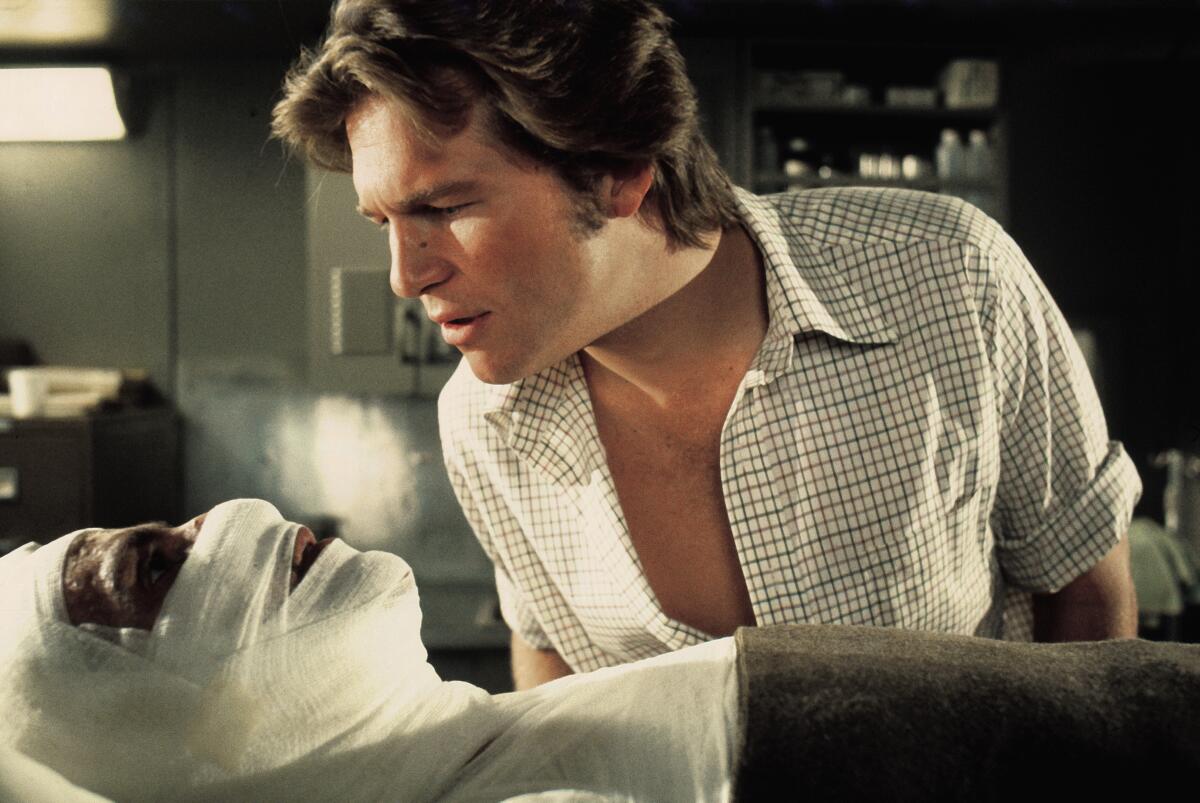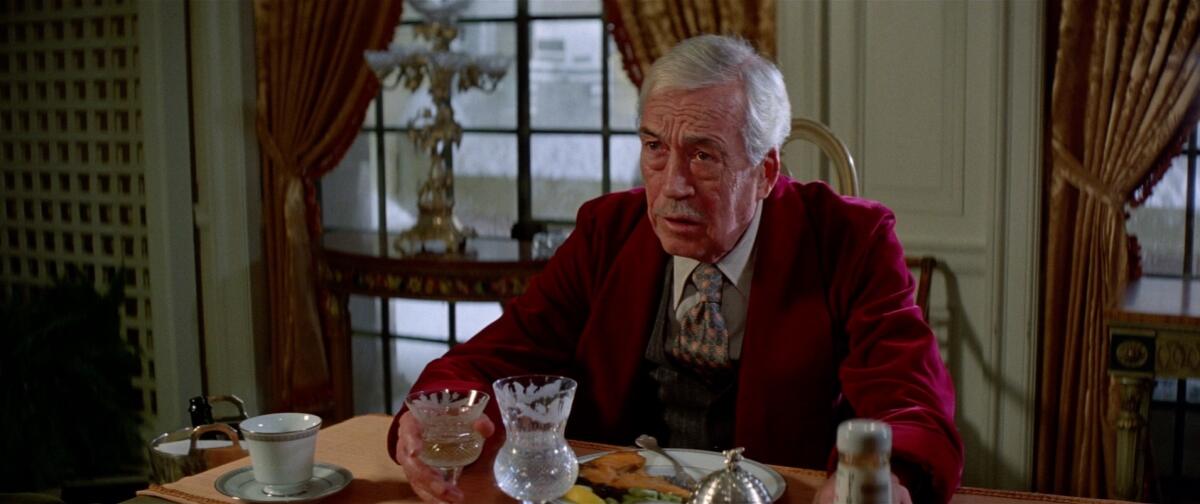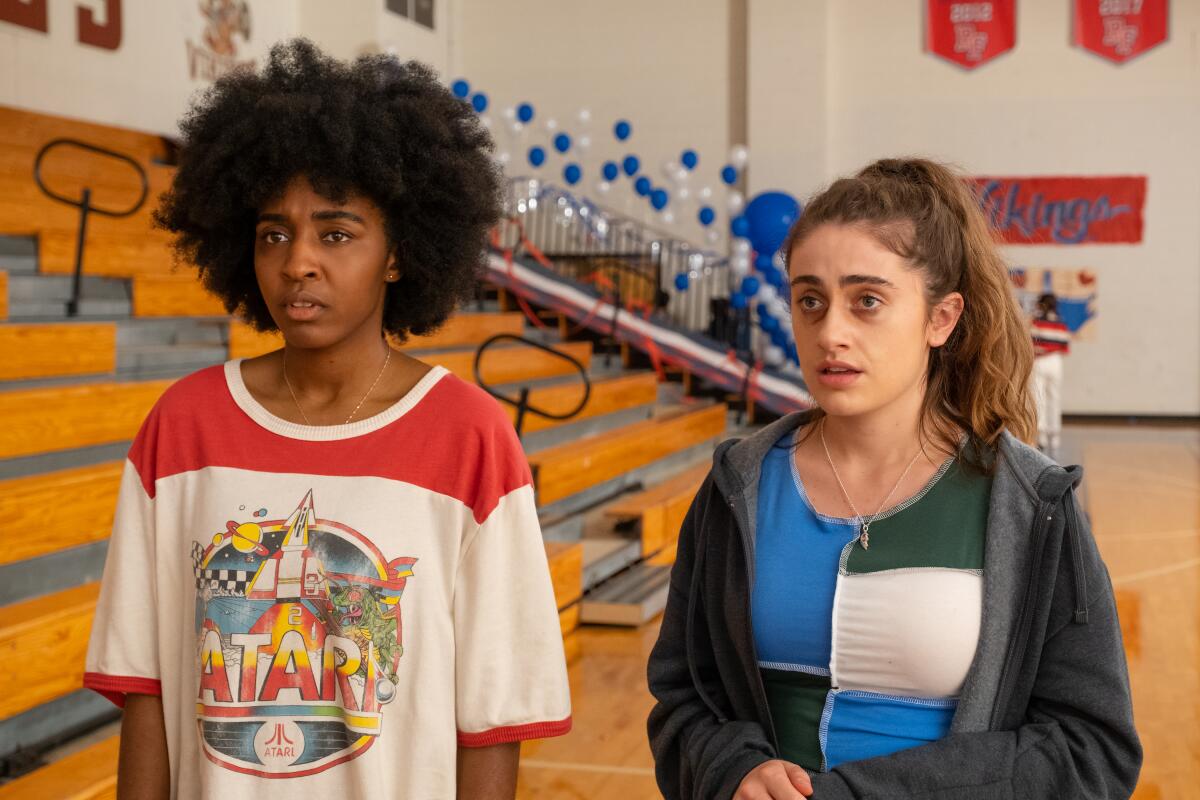Quentin Tarantino wants you to watch ‘Winter Kills,’ and more of the best to see in L.A.

- Share via
Hello! I’m Mark Olsen. Welcome to another edition of your regular field guide to a world of Only Good Movies.
Part of me feels guilty that I have been continually banging on about the Academy Museum’s summer series of concert films, but then I’ve also felt weird about the weeks when I haven’t mentioned it, skipping over recent screenings of D.A. Pennebaker’s “Depeche Mode 101” or Penelope Spheeris’ “We Sold Our Soul for Rock ’n Roll.”
Friday night may be one of the most exciting events of the series as “Homecoming: A Film by Beyoncé” plays in the museum’s main room. A document of her landmark 2018 performance at the Coachella music festival, the film is available to stream on Netflix but rarely plays in a theater. This should be a genuinely overwhelming experience.
And here’s the best of what’s playing in L.A. over the next week.
Tarantino, the JFK assassination and ‘Winter Kills’

William Richert’s 1979 conspiracy thriller “Winter Kills” begins a three-night run at the New Beverly Friday night in a newly struck 35mm print as part of the theater’s tribute to the reissue label Rialto Pictures. The film is being shown with a special “Quentin Tarantino presents” banner.
The movie itself arguably makes more sense now in our conspiracy-pilled moment than it might have on its original release, presenting a byzantine paranoid plot in which everything is connected. Jeff Bridges plays Nick Kegan, whose half brother was gunned down while serving as U.S. president. Years later, new clues start turning up as more people involved begin to die, leading Nick to a confrontation with his powerful industrialist father, played by John Huston. If this all sounds eerily like the story of the JFK assassination, it should, as the movie has a lot of fun with picking up bits and pieces — from a mysterious rifle to influential mobsters, enigmatic women and how power exerts itself to seemingly bend the very fabric of reality.
One can see why Tarantino has a special affection for the film, with its wild, whirlwind sensibility and offbeat mixture of high and low, the serious and the sleazy. Richert’s debut fiction feature, “Winter Kills” is an adaptation of a novel by Richard Condon, who also wrote “The Manchurian Candidate.” The movie features cinematography by Vilmos Zsigmond, himself in the midst of a legendary run that included “Close Encounters of the Third Kind” and Brian De Palma’s “Blow Out.” Production designer Robert Boyle worked on Hitchcock’s “North by Northwest” and “The Birds.” Composer Maurice Jarre also did “Lawrence of Arabia” and “Dr. Zhivago.”
The list of incredible talent involved in the movie doesn’t stop there, as alongside Bridges and Huston, the cast includes Anthony Perkins, Eli Wallach, Sterling Hayden, Dorothy Malone, Ralph Meeker, Toshiro Mifune and, in a role with only one line, Elizabeth Taylor.
The production backstory is almost as wild as the one presented onscreen. “Winter Kills” would be shut down for the better part of a year when the producers failed to pay their bills. With his shady practices and supposed underworld connections, producer Leonard J. Goldberg would eventually be murdered, shot while handcuffed to his bed, and his partner, Robert Sterling. would serve time in federal prison.
Director Richert died in 2022 at age 79. His other credits include directing “A Night in the Life of Jimmy Reardon,” which gave River Phoenix his first starring role, and contributing a powerful performance as an actor in Gus Van Sant’s “My Own Private Idaho.”
In his original 1979 review of the film, Times critic Charles Champlin wrote, “Like ‘The Iprcress File,’ ‘Three Days of the Condor’ and others in the genre, ‘Winter Kills’ is the kind of conspiratorial caper you like for its continual surprises or hate for its escalating confusions. … Unlike ‘The Parallax View,’ however ‘Winter Kills’ is not really attempting to prove a conspiracy theory, or on its own retry the Kennedy case. It means to have something to say about the uses and corruptions of power, but its prime intent as novel and film is to be a gaudy entertainment. The tone is extravagance, skidding into burlesque, and the story is to the Kennedy White House as James Bond is to the state papers of Earl Attlee or Harold Macmillan.”
I had a chance to preview the new print at the New Bev and it really does look great. This lost gem has never been given a better chance to shine and these few screenings should make for a great evening out.
A world of fun in ‘Bottoms’

“Bottoms” is one of the freshest films of the year, an idiosyncratic teen comedy that upends expectations at every turn. Directed by “Shiva Baby” filmmaker Emma Seligman, who co-wrote the screenplay with Rachel Sennott, the film follows two high school outcasts (Sennott and Ayo Edebiri, currently an Emmy nominee for “The Bear”) who start a fight club to get closer to a pair of cheerleaders they have crushes on. Silly, outrageously violent and proudly queer, the movie is a blast from start to finish. (And it even includes bloopers during the end credits!) Katie Walsh has our review in The Times, where she calls it “delightfully, unapologetically and hilariously vicious.”
I spoke to Edebiri, Sennott and Seligman together before the actors’ strike. The three have been collaborating in various permutations since they met in college and it is remarkable that their careers are now all hitting stride at the same time.
Seligman talked about the inspiration for the movie, saying, “I love high school movies and those are the movies that I rewatch the most and I would rewatch as a kid. Looking back, I would’ve loved to have seen more queer female characters, but I also would’ve loved to have seen girls beating each other up and fighting to save the day. And I love movies like ‘Scott Pilgrim’ and ‘Kick-Ass’ and ‘Attack the Block’ and movies where a bunch of boys are getting together to be rambunctious and fight and do stuff. And so this was a culmination of a lot of different kinds of movies with young teen female characters I wish I could have seen.”
Other points of interest
“CB4” at the American Cinematheque As part of a series curated by the Instagram account “directorfits,” which celebrates filmmakers’ personal fashion sense on and off the set, the American Cinematheque will be showing Tamra Davis’ 1993 comedy “CB4” on Saturday. The film is a parody of the rap scene of the time, with Chris Rock, Allen Payne and Deezer D starring as members of the group Cell Block 4. (CB4 for short.) Chris Elliott appears as a documentary director, while Phil Hartman plays a politician who attacks the group.
Davis, who will be there to introduce the screening, had an extensive resume making music videos for the likes of N.W.A., Depeche Mode, Sonic Youth and the Beastie Boys before she moved into features. Her other feature credits include “Guncrazy” “Billy Madison” and “Crossroads” before her more recent TV work, directing on shows such as “P-Valley” and “Dead to Me.”
In Michael Wilmington’s 1993 Times review, he noted, “CB4” has a terrific comic point: that the ‘street’ overtones of rap can get co-opted by middle-class kids who have no clear idea of what the street and the underclass really are. The mock-macho gang is a crock; the real street violence comes back to haunt them. Despite their bottle-tipping, dirty-mouthed devil-may-care in the opening scenes, these guys are gag gangsters.”
“We Kill for Love” at Vidiots The new documentary “We Kill for Love” is an in-depth look at the direct-to-video erotic thriller, which the film positions as “a lost world of B-movies so manifold in type no single survey can theorize them all.” But this movie sure does try, exploring the world created by their bold, lurid images and soundtracks of bubbling synths and steamy saxes that have now imprinted themselves onto generations of film fans well beyond those who might once have perused VHS video stores or flipped channels on late-night cable. Directed by Anthony Penta, the doc digs deep, including interviews with filmmakers, performers and scholars. If nothing else, you will walk away with a long list of movies you’ll likely want to check out, if you can find them.
The film plays on Thursday at Vidiots with Penta and other special guests in person, before being available on demand Sept. 1.
“The Empire Strikes Back” at the Chinese Theatre On Wednesday, Irvin Kershner’s “The Empire Strikes Back” will play at the TCL Chinese Theater as a charity event for the Will Rogers Motion Picture Pioneers Foundation. The opportunity to see this movie in that theater is well worth the premium price of admission.
In his incredibly insightful review upon the film’s initial release in 1980, The Times’ Champlin wrote, “‘The Empire Strikes Back’ seems to me a hugely accomplished and exciting follow-on to ‘Star Wars’ .… It could hardly have been otherwise. The magic of ‘Star Wars’ derived from George Lucas and his love of make-believe, at once childlike and hugely sophisticated, and from his myth-sized view of the absolutes of good and evil, courage and treachery. Lucas knows Once Upon a Time the way Hugh Hefner, in a remote part of the forest, knows bachelor dreams.”
“How to Blow Up a Pipeline” on Hulu The eco-heist-thriller “How to Blow Up a Pipeline” remains one of the most urgent, exciting new releases of the year, with an energizing young cast, and it just started streaming on Hulu. While there is something delightfully demented (and a touch counterintuitive) about the fact that a film based on a radical Swedish political manifesto should now be available on a platform that’s majority-owned by Disney, as director Daniel Goldhaber said to me earlier this year, spreading the film’s message as broadly as possible was always part of the point.
“What matters is getting these ideas into the public consciousness and starting a debate on a universal level,” said Goldhaber. “When you only make culture that appeals to the niche, you send the message that progressivism is only meant for a niche audience.”
Only good movies
Get the Indie Focus newsletter, Mark Olsen's weekly guide to the world of cinema.
You may occasionally receive promotional content from the Los Angeles Times.




